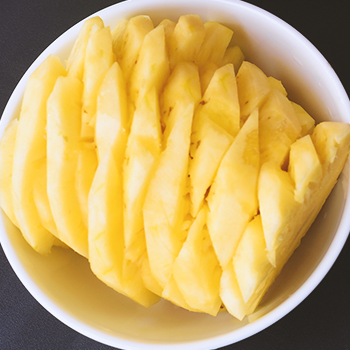As a dietitian, I'm always exploring foods that can aid in fat loss and its maintenance for my patients.
Aware of the high vitamin and mineral content in pineapples, essential for numerous bodily functions, I embarked on a week-long investigation of the whole fruit and consulted with fitness experts to determine its potential in fat burning.
Additionally, I examined whether consuming a slice of pineapple daily during this study would lead to noticeable weight loss outcomes.
Here are all the insights I gathered.
Quick Summary
- Pineapples aid in fat loss by containing enzymes, vitamins, and minerals that support metabolism and digestion.
- Regular consumption of pineapple, as part of a balanced diet, can help reduce calorie intake and curb appetite.
- Research from the National Institutes of Health suggests that maintaining a balance between antioxidants and free radicals is crucial for healthy cellular functioning, hormonal equilibrium, and improved weight management.
- In my opinion, incorporating pineapple into a healthy diet can be a delicious and effective way to support weight loss goals.
Can Pineapples Help You Lose Belly Fat?

According to WebMed, pineapples can help you lose belly fat because they contain enzymes, vitamins, and minerals that aid in many cellular functions, such as digestion and metabolism [1].
They are also high in antioxidants, which have been shown to help reduce fatty tissue by inhibiting the production of triglycerides, a type of fat present in the blood.
Moreover, a pineapple diet is low in calories, but it is unlikely to help you lose weight quickly.
This fruit may be beneficial for weight loss if combined with a healthy eating plan and regular exercise.
How Does Eating Pineapple Burn Fat?

I've observed that pineapple can aid in fat burning by reducing appetite, enhancing digestion, and boosting energy levels.
Let's delve into the details of its fat-burning benefits.
Lowers Calorie Consumption
Pineapple can assist people in losing weight by reducing calorie intake.
They are a healthier alternative to sweets since they are relatively low in calories but tasty enough to satisfy your taste buds.
Additionally, pineapples contain natural sugars, which research indicates promote short-term satiety, allowing you to eat less throughout the day and avoid cravings.
Improves Metabolism

Because of its high manganese content, eating pineapple is one of the best methods to boost metabolism as it may help prevent weight gain.
Accoring to the National Institute of Health (NIH), manganese acts as an enzyme activator, which is vital to many biochemical reactions [2].
These natural chemical processes help with metabolism, which is the rate of nutrient absorption within the body.
This is needed to burn extra calories even when the body is at rest.
Enhances Digestion
Pineapples contain a proteolytic enzyme called bromelain that, according to ScienceDirect, helps digest milk protein and other proteins found in food [3].
"Bromelain helps in better protein digestion and utilization, and thus helps you gain lean body mass. It also helps in mobilizing belly fat."
- Lovneet Batra, Nutrition Expert, Delhi
According to NIH, protein have a high thermic effect on the body, so digesting and absorbing them takes more energy, resulting in a higher calorie burn [4].
Also, protein is very satiating and helps rebuild muscles; therefore, digesting and absorbing this macronutrient better might lead to higher metabolism and more lean muscle mass.
Helps Curb Appetite

Pineapples may help curb appetite because they are loaded with fiber. According to research by NIH, consuming foods high in soluble fiber helps keep your gut healthy and prevent cravings [5].
Furthermore, dietary fibers take longer to digest, making you feel fuller and eat less throughout the day, which, according to WebMed, can result in belly fat loss [6].
Promotes Hormonal Balance
According to a study from the National Library of Medicine, pineapples are antioxidant-rich foods that have been shown to help reduce inflammation and protect the cells in your body against free radicals [7].
According to research by NIH, having a balance between antioxidants and free radicals can help the body maintain healthy cellular function, hormonal balance, and, consequently, better weight management [8].
Boosts Physical Performance
Because pineapple is composed of 80 to 89 percent water, it promotes hydration, which, according to NIH, may improve your concentration, endurance, and workout performance [9].
Also, pineapple contains vitamins and minerals that can give you more energy and has the aforementioned enzyme bromelain, which has been shown to aid in pre-workout and post-workout recovery.
Are There Other Health Benefits to Eating Them?

I can confirm that consuming pineapples offers additional health advantages, such as bolstering the immune system and reducing cancer risks.
Research from NIH suggests that the high content of vitamin C in pineapple helps white blood cells function more effectively, contributing to the body’s stronger immune defense against sickness [10].
Furthermore, pineapples are high in antioxidants, which, according to NIH, combat oxidative stress that damage cells, lowering the risk of chronic diseases like heart disease, diabetes, and Alzheimer's [11].
Is It Safe to Consume It Every Day?
Yes, it is safe to consume pineapple every day as long as you don't consume more than the recommended serving size, which is one cup or 165 grams per day.
Because pineapple is high in vitamin C, consuming more than one and a half cups per day may cause some minor side effects like nausea, stomach pain, and heartburn.
Moreover, researchers from the National Library of Medicine found that eating unripe fruit can lead to severe diarrhea while consuming too much causes an allergic reaction and an increased risk of bleeding [12].
How It Compares With Other Fruits
Pineapples, compared to other weight-loss-friendly fruits like apples, berries, and grapefruit, stand out for their high vitamin C and manganese content. They're also rich in bromelain, an enzyme aiding digestion and inflammation reduction.
- Apples, lower in calories, offer dietary fiber, promoting satiety.
- Berries, packed with antioxidants and fiber, are low in calories yet high in nutrients.
- Grapefruit, often associated with weight loss, has a unique compound that may reduce insulin levels.
Taste-wise, pineapples are sweet and tart, versatile in smoothies, salads, and grilled dishes, while other fruits vary from sweet (berries, apples) to tangy (grapefruit), suiting diverse dietary preferences.
FAQs
What Is the Best Time to Eat Pineapple for Weight Loss?
When it comes to weight loss, the best time to consume pineapple is between meals or about 30 minutes before a meal.
Furthermore, it is most effective at relieving muscle soreness if taken after a strenuous workout.
How Much Pineapple Should You Eat a Day to Lose Weight?
To lose weight, you should eat one cup of pineapple chunks or drink one glass of pineapple juice a day.
Consuming this much pineapple every day can help you burn body fat by boosting your metabolism and decreasing hunger pangs.
References :
- https://www.webmd.com/diet/ss/slideshow-health-benefits-pineapple#
- https://pubmed.ncbi.nlm.nih.gov/29293455/
- https://www.sciencedirect.com/topics/agricultural-and-biological-sciences/bromelains#
- https://www.ncbi.nlm.nih.gov/pmc/articles/PMC524030/
- https://www.ncbi.nlm.nih.gov/pmc/articles/PMC8624670/
- https://www.webmd.com/diet/compare-dietary-fibers
- https://pubmed.ncbi.nlm.nih.gov/31194785/
- https://www.ncbi.nlm.nih.gov/pmc/articles/PMC6701166/
- https://www.ncbi.nlm.nih.gov/pmc/articles/PMC2908954/table/T1/
- https://www.ncbi.nlm.nih.gov/pmc/articles/PMC5707683/
- https://www.ncbi.nlm.nih.gov/pmc/articles/PMC5707683/
- https://pubmed.ncbi.nlm.nih.gov/25517253/
About The Author
You May Also Like






